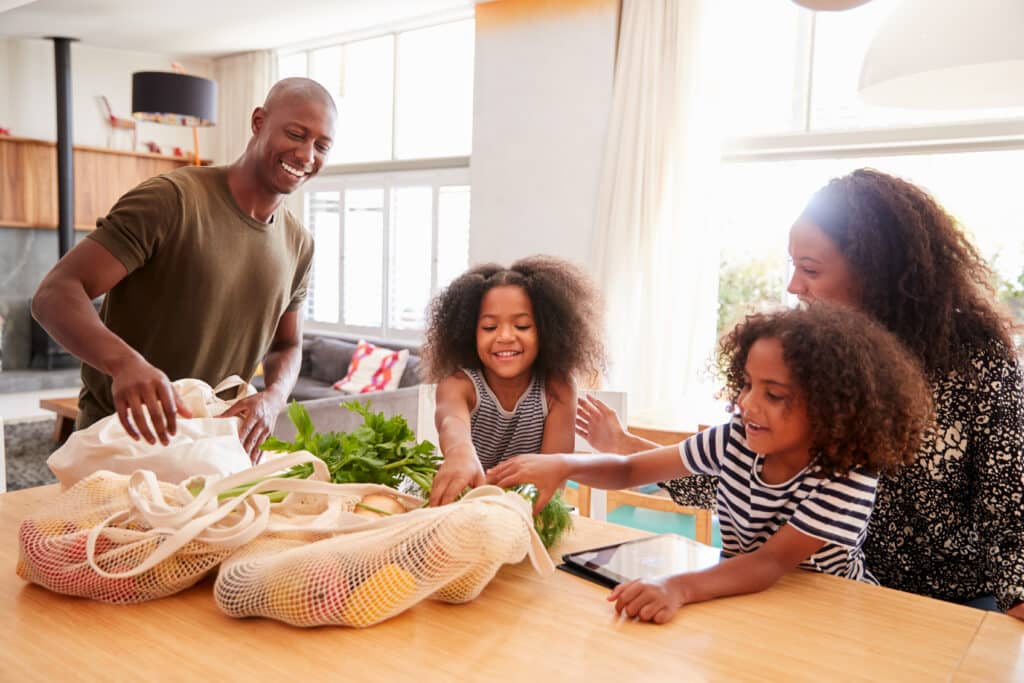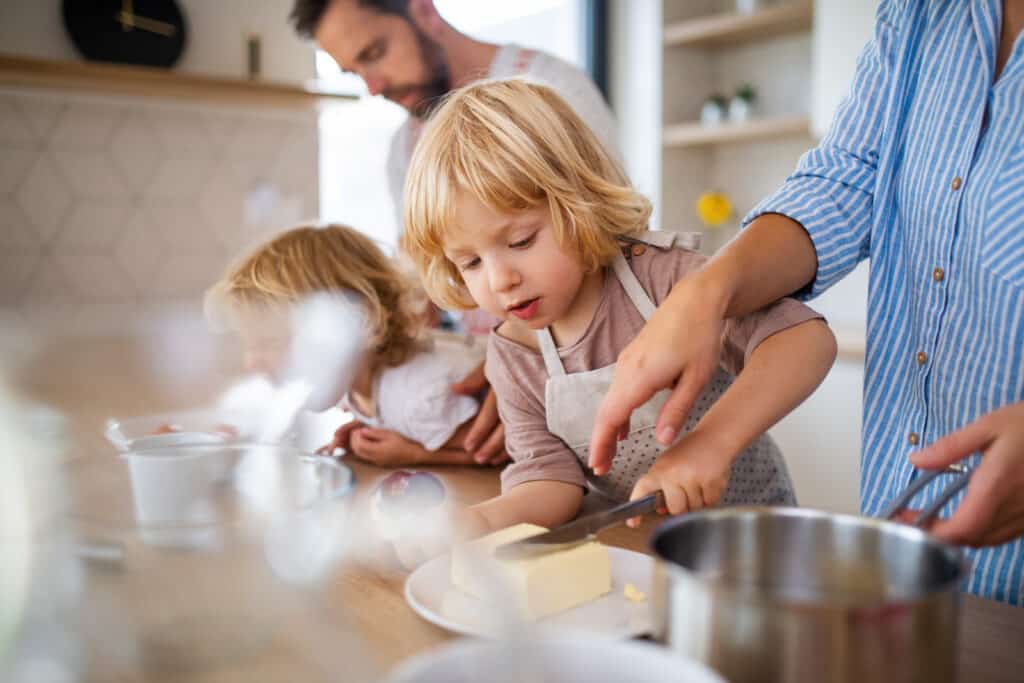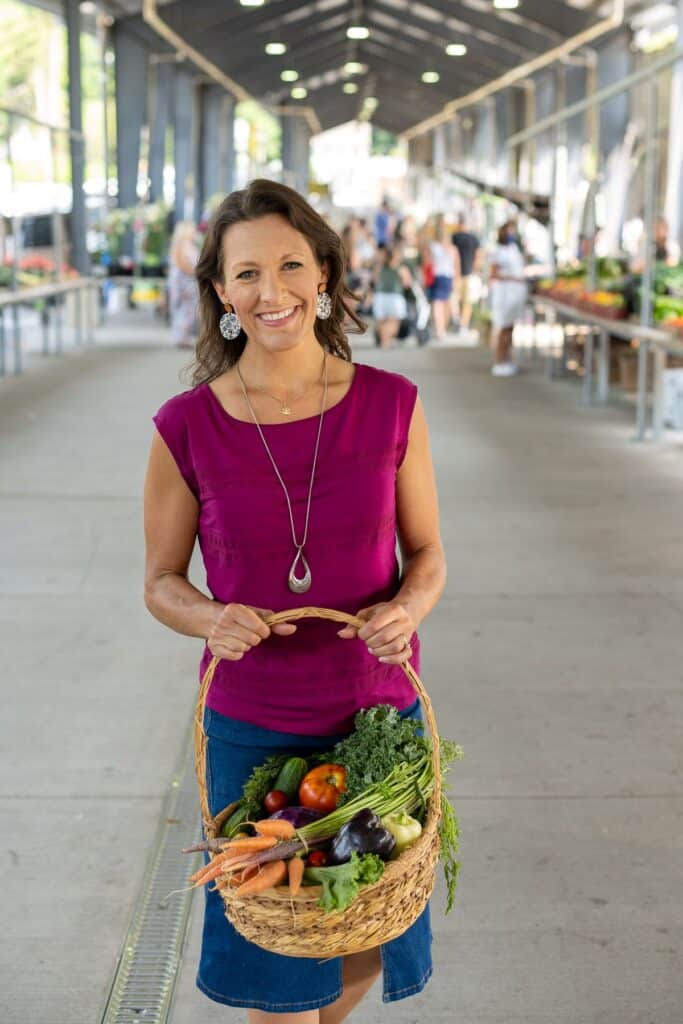My two older kids, Paul and Leah, have made dinner for our family of six about once a week for the last three years.
They’ve learned so many lessons through failure, such as nearly frostbitten fingers from trying to form partially thawed ground turkey into meatballs. That’s the result of poor planning ahead! And they’re much better at thawing meat the night before now.
They’ve learned lessons through success, too, like the day they had no plan but created out of their imaginations a beautiful breakfast burrito spread with homemade whole wheat tortillas, sausage from scratch, and roasted fingerling potatoes. The only loser that day was me coming home from youth group, because the family had eaten the entire dinner!
And they’ve bonded and connected many times over their signature recipe, a grain-free homemade pizza. They have a lot of fun together making it as you can see in the pizza video they made together.
When I tell people that Paul and Leah have cooked over 100 dinners for our family, you can see the wistfulness in their faces. It’s a mixture of hope, jealousy, and immediate defeat. So many parents think, “That could never happen in my house. My kids are too little. They don’t have the skills, etc.”
So it’s my job to remind parents never to compare your beginning to my end!
It was six years ago that I spent a summer intentionally and intensely teaching my kids to cook. Because of that investment pulling out all the stops and the continued practice, they are well trained. But you have to start somewhere!
So let’s talk about those kids who are interested in cooking and whose parents’ minds turn to defeat when they hear about kids who cook dinner for their family regularly.
There are savvy ways to motivate kids, and I’ve got five practical ideas for you.

1: Serving Others Food Generates Compliments and Confidence
We know that confidence is addictive in the best way possible. Let’s use this to our advantage!
If you can invite a child to be part of a meal or recipe, even something as simple as measuring a teaspoon of salt, that child has some ownership.
If that recipe is served to other adults, whether that’s grandparents visiting for dinner or a big family potluck for a holiday gathering, when the adults find out the child was involved, the compliments naturally flow. Kids love being told they’ve done a good job!
When it comes to authentic adult skills like cooking, the compliments mean even more. That dose and boost of confidence will certainly raise their self-esteem. This all feels so good that the kids then want to come back for more.
It’s kind of like the social media cycle of dopamine that sucks them into TikTok or YouTube. At least this time we are using their neurocircuitry for a positive goal! 😉
So step one then is to find a time when other adults will be eating food made in your kitchen. Do anything you can do to get your child involved, and the snowball effect will be set in motion.
2: Little Kids Think Cooking Is a Big Kid Skill
That last tip works for any age across the board, but this one is for our little ones – let’s say seven and under.
I’m sure you’ve seen it work in the past: A parent says, “You want feta cheese? That’s a big adult flavor.” And suddenly, you have two boys who eat feta cheese like it’s going out of style (that’s my actual experience).
Or your child asks to help, and you say, “No, not right now. Mommy can do this faster than you.” At first they are more committed than ever to helping because of reverse psychology. They want to be fast too!
Of course, after a few times being shoved out of the kitchen, they learn that it’s not a place for them.
Our goal, again, is to use this mental trick in a positive way.
Tell your little ones that using a knife to cut a banana is such a big kid skill, and when they learn it, they’ll be acting bigger. It seems all little kids want to grow up faster!
This one takes hardly any effort at all and applies to any skill in the kitchen that you want to promote for younger children.
3: Appreciate Quality Family Time While Cooking
Some kids deeply value time one-on-one with their parents. Especially for kids in larger families, this can be hard to come by. That means if you can carve out 30 or 60 minutes to dedicate to one child, they will be pretty motivated to do whatever it is that’s going on.
This strategy won’t work for all children, but any parent will immediately recognize if they have a child for whom it’s perfect. If you have one of those who values connection, make this happen!
Set up a time when your spouse, neighbor, grandparent, aunt, or friend can take your other kids for a short amount of time so that you can set aside special quality time with one child to make something with them.
Similar to the “serving others, creating confidence” strategy, the positive feelings generated in the kitchen will replicate and create that snowball effect of the child wanting to come back for more.
Eventually, you won’t have to set aside dedicated time every time, but your child can simply work alongside you in the midst of the chaos because they are well trained.

4: Choice and Agency Can Motivate Kids to Cook
What about those older kids, our tweens and teens who may not be motivated by compliments or alone time with Mom and Dad? What does a teenager want more than anything?
Plumbing into the mind of a teenager is difficult and dangerous, but one thing is for sure: they want to make their own choices. Teens want to be in charge!
That’s why when parents point out that whoever cooks the meal gets to choose the menu, it makes a huge difference for our older kids. In fact, when my kids Paul and Leah are asked why they like knowing how to cook, one of their top answers is often just that: “We get to cook what we like.”
So set it up that way: “If you learn some cooking skills, enough to cook dinner or even one recipe, you get to choose what is served.”
Yes, emphasis on the “you.” This one is all about the child and their choice.
5: Big Families Use Teacher Assistants When Teaching Kids to Cook
Over at Kids Cook Real Food, we tend to attract a lot of families with more than the requisite two children. Many of those parents come into our VIP Facebook group with a similar conundrum:
“Where do I start my kids? I have a 12-year-old and younger kiddos. Do we all start at the Beginner level even though it will be too easy for them? If I start the 12-year-old at the Advanced level with chef’s knives, won’t they be missing out on important skills?”
The community and I always give the same answer: use a teacher assistant.
Older children in the family can be teacher assistants to help their parents control the chaos of teaching a few little ones basic cooking skills. That way they have some ownership, choice, and agency; are building confidence; and also are gleaning the skills that perhaps they don’t yet have even as an older child simply because of lack of experience.
Most kids enjoy being asked to help in a regulatory role over their siblings, so this one can be fairly powerful and simple. It works especially well when you are using a defined curriculum with skill-based videos, like Kids Cook Real Food. Head over and see if it’s right for your family.
Can You Teach Your Kids to Cook?
Yes, you can! Even if your kids don’t seem initially motivated, as long as you as a parent are motivated enough to get strategic, I can almost guarantee positive results.
When you start teaching your kids to cook, it will increase your family connection, raise their confidence, and give them an outlet for creativity that we don’t find often enough in our modern screen-based world.
I look forward to hearing your successes teaching your kids to cook!!

Katie Kimball is the voice of healthy kids cooking, working to restore the health of our young generation one kitchen at a time. She’s a cookbook author, Certified Stress Mastery Educator, two-time TEDx speaker, and regular TV contributor who has shared her journey to real food and natural living since 2009 at Kitchen Stewardship, a blog that helps families stay healthy without going crazy. Along with her 4 children, she created the Kids Cook Real Food eCourse to help other parents teach their kids to cook, build family connection in the kitchen, and supercharge kids’ confidence and creativity.






